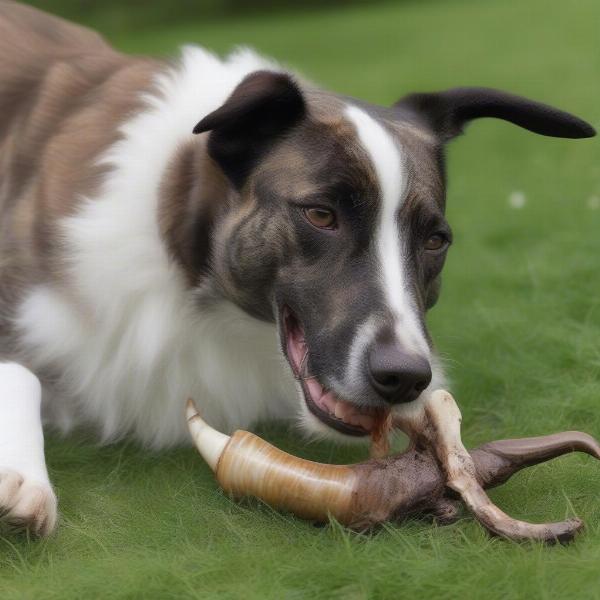Goat horns are often marketed as natural chew toys for dogs. But are they truly a safe and healthy option? This article delves into the potential benefits and risks of giving your dog goat horns, offering practical advice to help you make informed decisions about your dog’s chewing habits. We’ll explore everything from the nutritional value (or lack thereof) to the potential hazards of splintering and digestive issues.
Understanding the Appeal of Goat Horns for Dogs
Many dog owners are drawn to goat horns as a “natural” alternative to commercially produced chew toys. They’re often perceived as more durable and longer-lasting, which can be appealing for dogs who are enthusiastic chewers. The idea of providing something natural also aligns with a growing trend towards more holistic pet care. However, it’s crucial to understand the actual benefits and risks before offering goat horns to your furry friend.
 Dog Chewing Goat Horn
Dog Chewing Goat Horn
Potential Risks of Goat Horns for Dogs
While goat horns might seem like a durable and natural chew toy, several potential risks need careful consideration. One of the most significant concerns is the risk of splintering. Goat horns can break into sharp fragments, which can cause injuries to your dog’s mouth, throat, or digestive tract. These splinters can also become lodged in the intestines, leading to blockages requiring surgical intervention. Another potential issue is digestive upset. Some dogs may experience vomiting, diarrhea, or constipation after chewing on goat horns.
Safer Alternatives to Goat Horns
Fortunately, several safer and more appropriate chew toys are available for dogs. Look for toys made from durable, non-toxic materials designed specifically for chewing. These toys come in various shapes, sizes, and textures to cater to different breeds and chewing styles.
Chew Toys for Aggressive Chewers
For dogs known for their powerful jaws and destructive chewing habits, opt for extremely durable toys made from materials like hard rubber or nylon. Look for toys specifically labeled for aggressive chewers. These are typically designed to withstand intense gnawing and are less likely to splinter or break.
Chew Toys for Puppies and Senior Dogs
Puppies and senior dogs often have more sensitive teeth and gums. Choose softer chew toys made from materials like natural rubber or plush. These are gentler on their mouths and less likely to cause discomfort.
Making Informed Decisions about Your Dog’s Chewing Habits
Providing appropriate chew toys is essential for your dog’s dental health, mental stimulation, and overall well-being. When choosing a chew toy, always consider your dog’s size, age, breed, and chewing style. Avoid giving your dog cooked bones, rawhide, or other materials that can splinter or pose a choking hazard. Regularly inspect your dog’s chew toys for signs of wear and tear and replace them as needed.
Conclusion
While goat horns may seem like a natural option, they present significant risks to your dog’s health. The potential for splintering and digestive issues makes them an unsuitable choice for most dogs. By choosing safe and appropriate alternatives, you can ensure your dog enjoys the benefits of chewing without the associated dangers. Remember to consult with your veterinarian if you have any concerns about your dog’s chewing habits or dental health.
FAQ
- Are there any benefits to giving dogs goat horns? While some claim goat horns offer dental benefits, the risks outweigh any potential advantages.
- What should I do if my dog swallows a piece of goat horn? Contact your veterinarian immediately. Swallowed splinters can cause serious internal injuries.
- What are some good alternatives to goat horns for aggressive chewers? Look for toys made from durable nylon or hard rubber designed specifically for aggressive chewers.
- Can puppies chew on goat horns? No, goat horns are not safe for puppies due to their developing teeth and the risk of choking.
- Are there any natural chew toys that are safe for dogs? Yes, there are many safe and natural chew toys such as bully sticks, sweet potato chews, and certain types of antlers. Always supervise your dog with any new chew toy.
- How often should I replace my dog’s chew toys? Replace them as soon as they show signs of significant wear and tear or if they become small enough to be swallowed.
- My dog doesn’t seem interested in chew toys. What can I do? Try different textures, flavors, or interactive puzzle toys to find something that appeals to your dog.
ILM Dog is a leading international pet website dedicated to providing expert advice on all aspects of dog care and well-being. From breed selection and health advice to training tips and product recommendations, ILM Dog offers a wealth of resources for dog owners worldwide. For further assistance or personalized guidance, please contact us at [email protected] or call us at +44 20-3965-8624.